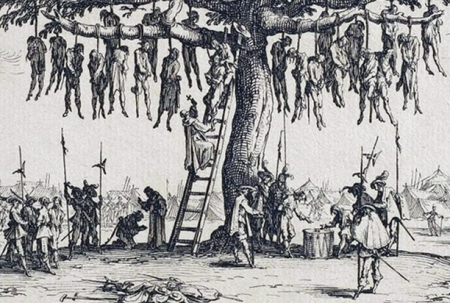
In 1723 the mayor of Tenby, Thomas Athoe, along with his son, also named Thomas, were apprehended and charged with murdering George Merchant. According to trial records, the two parties had quarreled over the sale of some cattle. The Athoes also bore a grudge against George Merchant, who had “married a sweetheart of young Athoe’s”.
Seeking revenge, the Athoes tracked Merchant and his brother, Thomas, to a place called Holloway’s Water. Using “great sticks”, the Athoes knocked the Merchants from their horses and beat them viciously. They then fell into a frenzy of genital grabbing, George Merchant coming off the worst:
“Taking fast hold of [Thomas Merchant’s] privities, [Athoe Senior] pulled and squeezed him to such a violent degree that had he continued so doing a few minutes longer, it had been impossible for the poor man to have survived it. The pain he suffered is past expression, and yet it fell short of what his brother endured. Young Athoe… seized him by the privy members and, his yard being extended, be broke the muscles of it, and tore out one of his testicles, and calling to his father said ‘Now I have done George Merchant’s business!’ This horrible action occasioned a vast effusion of blood.”
As George Merchant lay dying, Athoe Junior caught hold of “the deceased’s nose with his teeth [and] bit it quite off”. Surgeons who examined Merchant’s body post mortem suggested that his wounds were “sufficient to have killed six or seven men”. The Athoes claimed to have acted in self defence after been attacked by the Merchants, however they produced no evidence of an assault.
The Athoes were found guilty and transported to London. In July 1723, they were dispatched from a ‘hanging tree’ on the Canterbury Road, near what is now Walworth.
Source: Select Trials for Murders, Robberies, &c., Vol. 1, December 1720-October 1723. Content on this page is © Alpha History 2019-23. Content may not be republished without our express permission. For more information please refer to our Terms of Use or contact Alpha History.
